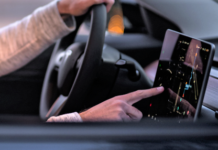THE Province is taking a first step in what will be a two-part approach to protect British Columbians from distracted drivers on roads and highways.
First, effective October 20, amendments to the Motor Vehicle Act (MVA) regulations will increase the driver penalty points from zero to three for drivers who are caught talking on a handheld device while driving. This new penalty, which also covers infractions like watching a DVD, programming a phone’s GPS, and operating hand-held audio players, is being combined with the $167 fine already in place and is now consistent with the three points and $167 fine currently given to drivers for texting.
Penalty points remain on a person’s driving record for five years and can result in further penalties, including prohibitions from driving. Specifically, any driver with more than three points has to pay a penalty premium on their insurance, starting at $175, and escalating if they receive more penalty points. The penalty for anyone who receives more than one distracted driving ticket in a year is at least $634 – the equivalent of two fines and a $300 penalty premium for six points. As points accrue, the Superintendent of Motor Vehicles may also identify a driver as high risk and monitor or prohibit them under the Driver Improvement Program (DIP).
For the second part of B.C.’s approach, the Province continues to look at increased fines for distracted driving and work is underway to determine what an appropriate amount would be. B.C. will continue to monitor the effectiveness of similar legislation in other jurisdictions and their fine amounts. Going forward, the government will also be reviewing and looking to adjust the overall fine structure in the MVA, including specifically those fines for distracted driving and other risk-based offences.
Attorney General and Minister of Justice Suzanne Anton said: “I’m very concerned that distraction in all forms is the second highest contributing factor in motor vehicle fatalities in B.C. It’s clear that the $167 fine is not enough on its own, so we’re starting by targeting those people who are talking on a handheld device while they’re driving with more severe penalties. Ticket volumes show us that more drivers are ticketed for talking on an electronic device than for texting and driving, and so that is where we decided to start with the new penalty points.
“Adding these new penalty points to the ticket will quickly identify for us the drivers who see the fine simply as the cost of doing business. Some of them will have to pay a driver penalty point premium, while others will more quickly end up being monitored by the Superintendent and possibly even prohibited from driving, which will improve safety for all road users.”
Minister of Transportation and Infrastructure Todd Stone said: “We’re focusing on penalties that will change people’s behaviour. Increasing penalty points is an important first step and increasing fines is something that remains on the table. By reviewing the entire fine structure of the Motor Vehicle Act, we’ll be able to make sure that the financial penalties for all traffic offenses are a sufficient deterrent to keep our roads safe.”
Chief Neil Dubord, BC Association of Chiefs of Police Traffic Safety Committee Chair said: “We welcome this first step in B.C.’s latest efforts to stop distracted driving. Together, police and government are tackling this serious safety issue through education, enforcement and legislation. Police officers are often the first on the scene after serious collisions, many caused by driver distraction. We want people to understand that using an electronic device while driving can be a fatal choice, for you and the other road users whose lives you put in danger.”
Quick Facts:
* Distracted driving is the second leading cause of vehicle fatalities in B.C. On average from 2009 to 2013, 88 people were killed due to inattention or distraction while driving each year, compared with 105 for speeding and 86 for driving affected by alcohol or drugs.
* The provincial government, ICBC and police have partnered to remind British Columbians to keep their hands on the wheel and their eyes on the road. The recently launched distracted driving awareness campaign included television, radio and theatre ads, and encourages drivers to put their electronic devices away especially as winter weather approaches and driving conditions require extra care and attention.
* In 2013, police issued 51,200 violation tickets to drivers who were using an electronic device.
* Under the definition of using an electronic device, there is a complete ban on a driver:
– Holding, operating, communicating or watching the screen of a hand-held electronic communication device.
– Sending or receiving text messages or email on any type of electronic device.
– Holding, operating, communicating or watching the screen of a hand-held electronic computing device, one of the purposes of which is to process or compute data.
* As well, B.C.’s distracted driving legislation prohibits drivers in the Graduated Licensing Program (GLP) from using hands-free devices.
* Police can also issue tickets for driving without due care and attention, or driving without consideration, to drivers who are noticeably distracted or inattentive while operating a motor vehicle and making the road unsafe for other drivers, pedestrians, or cyclists.
* Research shows five seconds of texting while driving at highway speeds is like driving blindfolded for almost the length of an entire football field.
* Some drivers still do not understand that using an electronic device, such as talking on a cell phone or texting, while stopped at a red light is an offense under the MVA.
* To avoid the temptation of using a cellphone, drivers can:
– Make calls and send emails or texts before starting a vehicle.
– Safely pull over and turn off the vehicle before using a personal electronic device.
– During the duration of a trip, turn cellphones off or put them somewhere out of reach.
– Let all calls go to voicemail.
– Ask a passenger to make or receive calls or text messages.












